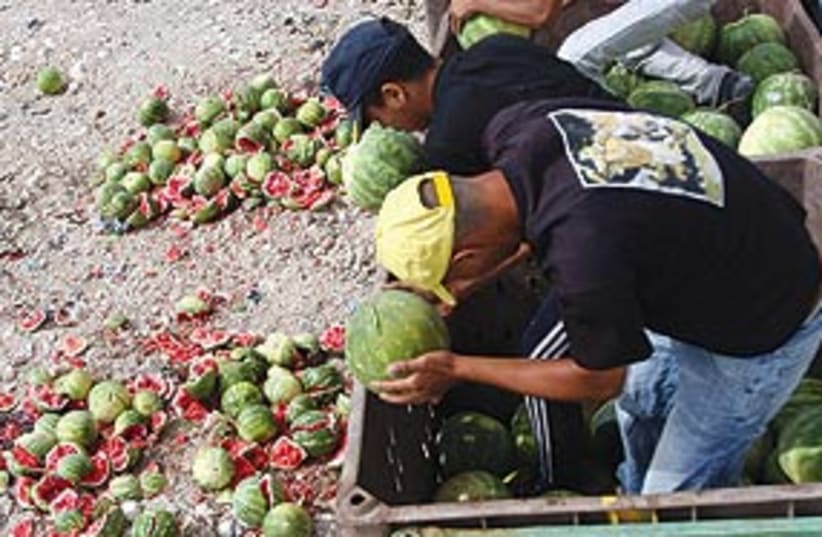RELATED:Arab Israelis boycott W. Bank goodsBoycott and spilloverAnalysis: Boycott puts social cohesion at riskThe weeklong campaign is aimed athelping the Palestinians achieve economic independence, said AdnanHusseini, the PA governor of Jerusalem.“We call on our peopleto boycott all settlement products because these settlements have beenlabeled illegal by the international community. Our people are capableof leading this economic war,” he said.The PA’s mufti, MuhammadHussein, said that the Palestinian “war” on the economy of thesettlements was a “civilized” method created by the Palestinians inorder to achieve their goals.Raed Dibai, coordinator of theanti-settlement drive in Nablus, said that the launching of thecampaign on the anniversary of the “Nakba” was a “clear message thatour people have waged an intifada against those responsible for the“Nakba.”Also on Tuesday, PA policemen confiscated trucks loadedwith watermelons in some Palestinian cities after claiming that theyhad come from settlements.Some Palestinians, however, expressedconcern over the fate of thousands of laborers who would lose theirjobs as a result of the anti-settlement boycott.HafezBarghouti, editor of Al-Hayat al-Jadida, the PA’s official mouthpiece,said the PA government should find jobs for the affected laborers. Hesaid that Palestinian businesses, which are expected to benefit fromthe boycott, should be the first to absorb the laborers when and ifthey are fired from jobs in settlements.The Council of JewishCommunities of Judea, Samaria and the Gaza Strip responded to the PAcampaign with an initiative of its own on Tuesday.On its newWeb site, it called on consumers to combat the boycott by purchasingproducts made by 58 companies with facilities in Judea and Samaria,including Pillsbury baking products, Nature Valley granola from GeneralMills, NatuR&D, Carmel Carpets, Brita, Supergum, Gazoz and Ahavacosmetics.In a statement it released to the media, the council said the boycottwas a “hostile action” that must be met with an immediate and sharpresponse.Such a boycott is an explicit violation of the 1994 Paris Agreement,the Protocol on Economic Relations between Israel and the PalestinianAuthority.The council called on Israel to use tax money it collects for the PA,to compensate the companies in Judea and Samaria for the losses theywill sustain as a result of the boycott.It also asked Israel to close its ports to Palestinian imports and torefuse to engage in proximity talks with those involved in the boycott.
PA declares mass settlement boycott
Campaign looks to ban all settlement-made products.

RELATED:Arab Israelis boycott W. Bank goodsBoycott and spilloverAnalysis: Boycott puts social cohesion at riskThe weeklong campaign is aimed athelping the Palestinians achieve economic independence, said AdnanHusseini, the PA governor of Jerusalem.“We call on our peopleto boycott all settlement products because these settlements have beenlabeled illegal by the international community. Our people are capableof leading this economic war,” he said.The PA’s mufti, MuhammadHussein, said that the Palestinian “war” on the economy of thesettlements was a “civilized” method created by the Palestinians inorder to achieve their goals.Raed Dibai, coordinator of theanti-settlement drive in Nablus, said that the launching of thecampaign on the anniversary of the “Nakba” was a “clear message thatour people have waged an intifada against those responsible for the“Nakba.”Also on Tuesday, PA policemen confiscated trucks loadedwith watermelons in some Palestinian cities after claiming that theyhad come from settlements.Some Palestinians, however, expressedconcern over the fate of thousands of laborers who would lose theirjobs as a result of the anti-settlement boycott.HafezBarghouti, editor of Al-Hayat al-Jadida, the PA’s official mouthpiece,said the PA government should find jobs for the affected laborers. Hesaid that Palestinian businesses, which are expected to benefit fromthe boycott, should be the first to absorb the laborers when and ifthey are fired from jobs in settlements.The Council of JewishCommunities of Judea, Samaria and the Gaza Strip responded to the PAcampaign with an initiative of its own on Tuesday.On its newWeb site, it called on consumers to combat the boycott by purchasingproducts made by 58 companies with facilities in Judea and Samaria,including Pillsbury baking products, Nature Valley granola from GeneralMills, NatuR&D, Carmel Carpets, Brita, Supergum, Gazoz and Ahavacosmetics.In a statement it released to the media, the council said the boycottwas a “hostile action” that must be met with an immediate and sharpresponse.Such a boycott is an explicit violation of the 1994 Paris Agreement,the Protocol on Economic Relations between Israel and the PalestinianAuthority.The council called on Israel to use tax money it collects for the PA,to compensate the companies in Judea and Samaria for the losses theywill sustain as a result of the boycott.It also asked Israel to close its ports to Palestinian imports and torefuse to engage in proximity talks with those involved in the boycott.